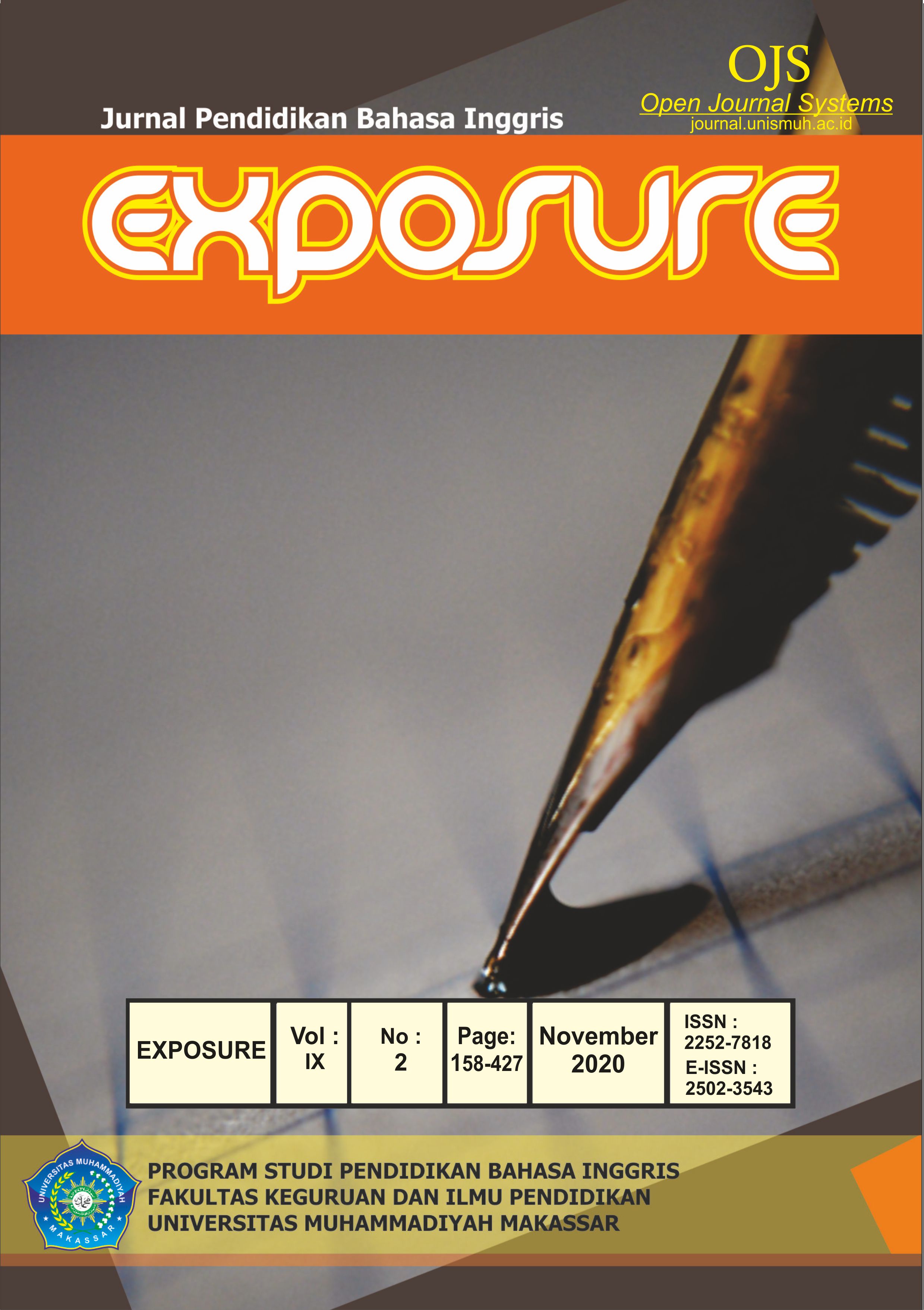THE IMPROVEMENT OF ENGLISH LANGUAGE ABILITY FOR INDUSTRIAL ENGINEERING STUDENTS THROUGH NON-ENGLISH LANGUAGE COURSES AT UNIVERSITY OF POTENSI UTAMA
DOI: https://doi.org/10.26618/exposure.v9i2.4056
English Language Ability, Assessment, Industrial Engineering Students
Abstract
English language ability is very important in globalization era. Especially if someone want to work in multinational companies, English language ability is the most important requirement. Among students at University of Potensi Utama, there is a lack of awareness indication English learning, especially the Industrial Engineering study program. The aims of this research is to identify students' motivation and their abilities in English by learning process. Another purpose is to develop their English ability. The subjects of this research were second semester Industrial Engineering students. This research was carried out from February 2020 to August 2020. Type of this research is descriptive qualitative. Technique of data collection by using a questionnaire and document review of teaching materials, questions and exams to reveal how the improvement of non-language students' English ability and their motivation in the use of English. The data analysis model that used by researcher is the triangulation technique model. The research result shows an increase in students' motivation and English ability. The value of the increase in high students’ motivation from 30.19% to 64.05%, the increase in high students’ ability from 15.03% to 39.21%, this is also evident from the change of the pretest average score of 50.49 to the average value of posttest 71.09.
References
Handayani, S. (2016). Pentingnya Kemampuan Berbahasa Inggris Sebagai Dalam Menyongsong ASEAN Community 2015. Ikatan Sarjana Pendidikan Indonesia (ISPI) Jawa Tengah Volume 3 Nomor 1, Mei 2016
Megawati, F. (2016). Kesulitan Mahasiswa Dalam Mencapai Pembelajaran Bahasa Inggris Secara Efektif. Jurnal Pedagogia ISSN 2089-3833 Volume. 5, No. 2, Agustus 2016
Megawati, F., Mandarani, V. (2016). Speaking Problems in English Communication. Artikel dipresentasikan pada the 1st ELTIC Conference. Universitas Muhammadiyah Purworejo, Jawa Tengah. 30 Agustus 2016.
Simbolon, N. (2014). Pengaruh Pendekatan Pembelajaran dan Kemampuan Verbal Terhadap Kemampuan Berbicara Bahasa Inggris Siswa SMA Negeri 14 dan 21 Medan. Cakrawala Pendidikan, Juni 2014, Th. XXXIII, No.2
Sinaga, F. (2010). Peranan Bahasa Inggris Dalam Era Globalisasi. Tersedia: http://kursusinggris.wordpress.com, diakses tanggal 12 Agustus 2019
Stanford, P. (2003). Multiple intelligence for every classroom. Intervention in school and clinic, 39(2), 80-85. Peranan Bahasa Inggris
Syafa’ah, H. K., L. Handayani. (2015). Pengembangan Metacognitive Self-Assessment mengukur Keterampilan Berpikir Evaluasi Membaca Teks Sains Berbahasa Inggris. Unnes Physics Education Journal. http://journal.unnes.ac.id/sju/index.php/upej
Wilujeng, T. T. R. (2014). Metode Self-Assessment Sebagai Metode Alternatif dalam Melakukan Evaluasi Belajar Mahasiswa. Jurnal Ilmiah Bahasa dan Sastra ISSN:23557083 Volume 1 Nomor 1 Juni 2014
Zaim, M. (2013). Asesmen Otentik: Implementasi dan Permasalahannya dalam Pembelajaran Bahasa Inggris di Sekolah Menengah. Proceeding of the International Seminar on Languages and Arts FBS Universitas Negeri Padang
Downloads
Published
How to Cite
Issue
Section
License
Authors who publish with this journal agree to the following terms:
In order to assure the highest standards for published articles, a peer review policy is applied. In pursue of the compliance with academic standards, all parties involved in the publishing process (the authors, the editors and the editorial board and the reviewers) agree to meet the responsibilities stated below in accordance to the Journal publication ethics and malpractice statement.
Duties of Authors:
- The author(s) warrant that the submitted article is an original work, which has not been previously published, and that they have obtained an agreement from any co-author(s) prior to the manuscript’s submission;
- The author(s) should not submit articles describing essentially the same research to more than one journal;
- The authors(s) make certain that the manuscript meets the terms of the Manuscript Submission Guideline regarding appropriate academic citation and that no copyright infringement occurs;
- The authors(s) should inform the editors about any conflict of interests and report any errors they subsequently, discover in their manuscript.
Duties of Editors and the Editorial Board:
- The editors, together with the editorial board, are responsible for deciding upon the publication or rejection of the submitted manuscripts based only on their originality, significance, and relevance to the domains of the journal;
- The editors evaluate the manuscripts compliance with academic criteria, the domains of the journal and the guidelines;
- The editors must at all times respect the confidentiality of any information pertaining to the submitted manuscripts;
- The editors assign the review of each manuscript to two reviewers chosen according to their domains of expertise. The editors must take into account any conflict of interest reported by the authors and the reviewers.
- The editors must ensure that the comments and recommendations of the reviewers are sent to the author(s) in due time and that the manuscripts are returned to the editors, who take the final decision to publish them or not.
Authors are permitted and encouraged to post online a pre-publication manuscript (but not the Publisher’s final formatted PDF version of the Work) in institutional repositories or on their Websites prior to and during the submission process, as it can lead to productive exchanges, as well as earlier and greater citation of published work (see The Effect of Open Access). Any such posting made before acceptance and publication of the Work shall be updated upon publication to include a reference to the Publisher-assigned DOI (Digital Object Identifier) and a link to the online abstract for the final published Work in the Journal.














